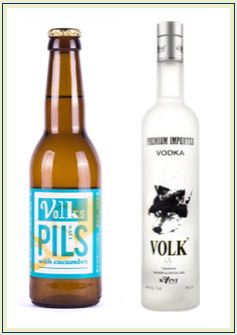The USPTO refused registration of the mark VOLKS PILS for "beer, lager" [PILS disclaimed], finding it likely to cause confusion with the registered mark VOLK for vodka. Applicant Marshall Brewing pointed to some 50 pairs of registrations for the same or similar marks for beer and vodka, owned by different entities, as proof that the goods are not related. How do you think this came out? In re Marshall Brewing Company, LLC, Serial No. 87019347 (April 9, 2018) [not precedential] (Opinion by Judge Marc A. Bergsman).

The Marks: The Board wasted little time in finding the marks confusingly similar, concluding that the addition of the letter "S" and the descriptive term "Pils" to the cited mark failed to distinguish the marks at issue.
The Goods: Examining Attorney Leslie Ann Thomas-Riggs submitted 12 use-based registrations covering both beer and vodka, as well as Internet evidence showing that beer, lager, and vodka may originate from a common source. News articles discussed the expansion by brewers into the distilling of spirits, including vodka.
Applicant Marshall pointed out that "beer" appears in the identification of goods in 14,009 live, use-based trademark registrations in class 32, and vodka in 1,980 use-based registrations in class 33. However, only 35 registrations cover both beer and vodka. The Board found this evidence of little probative value since it did not indicate whether the same entity has separate registrations for vodka and beer.
Applicant also submitted 109 pairs of third-party registrations for the same or similar marks owned by different entities, for beer and vodka. However, the Board found that half the registration pairs were for marks that were not similar. As to the other half, those registrations did not rebut the Examining Attorney's evidence because "[t]here is no requirement for goods to be found related that all or even a majority of the sources of one product must also be sources of the other product." Here, the evidence clearly demonstrates that there are entities that are the source of both vodka and beer.
The Board therefore concluded that the goods are related for Section 2(d) purposes.
Conditions of Sale: Because there are no limitations in the application and cited registration, the Board must presume that the goods travel in all normal channels of trade and are offered to all the usual classes of consumers for those goods. Potential customers are ordinary consumers who purchase and drink alcoholic beverages and include consumers who may buy inexpensive beer, lager, or vodka on impulse.
Conclusion: Balancing the relevant du Pont factors, the Board found confusion likely and it affirmed the refusal to register.
The content of this article is intended to provide a general guide to the subject matter. Specialist advice should be sought about your specific circumstances.
